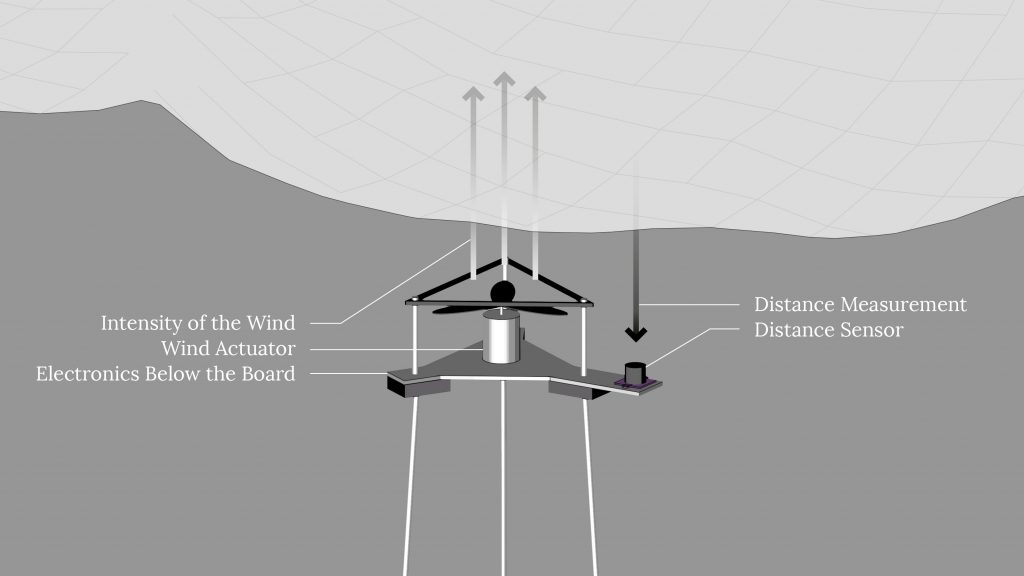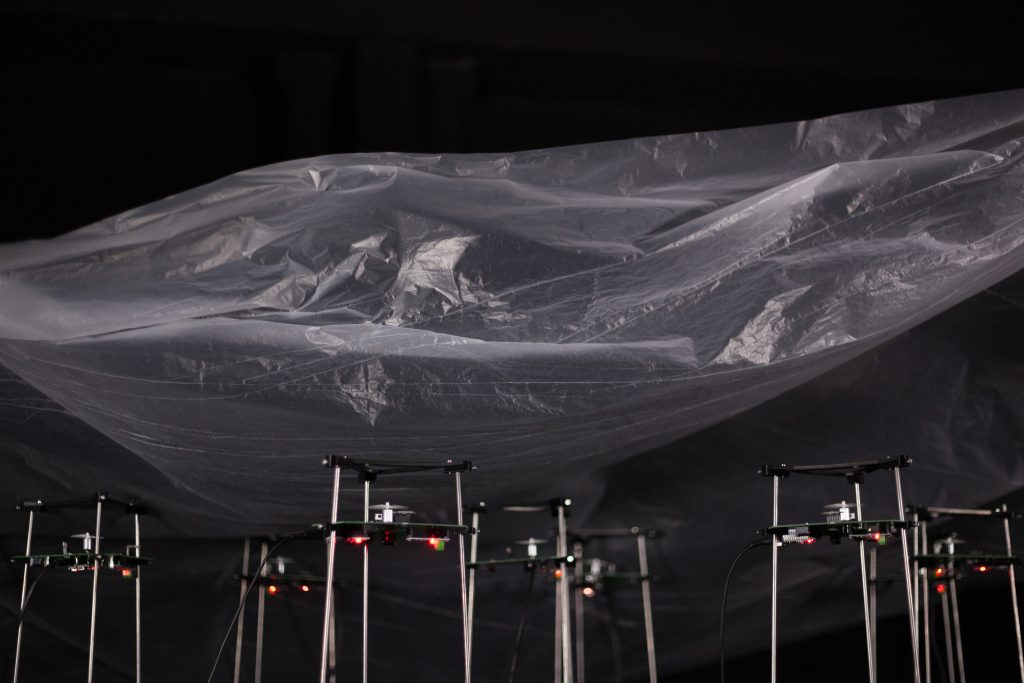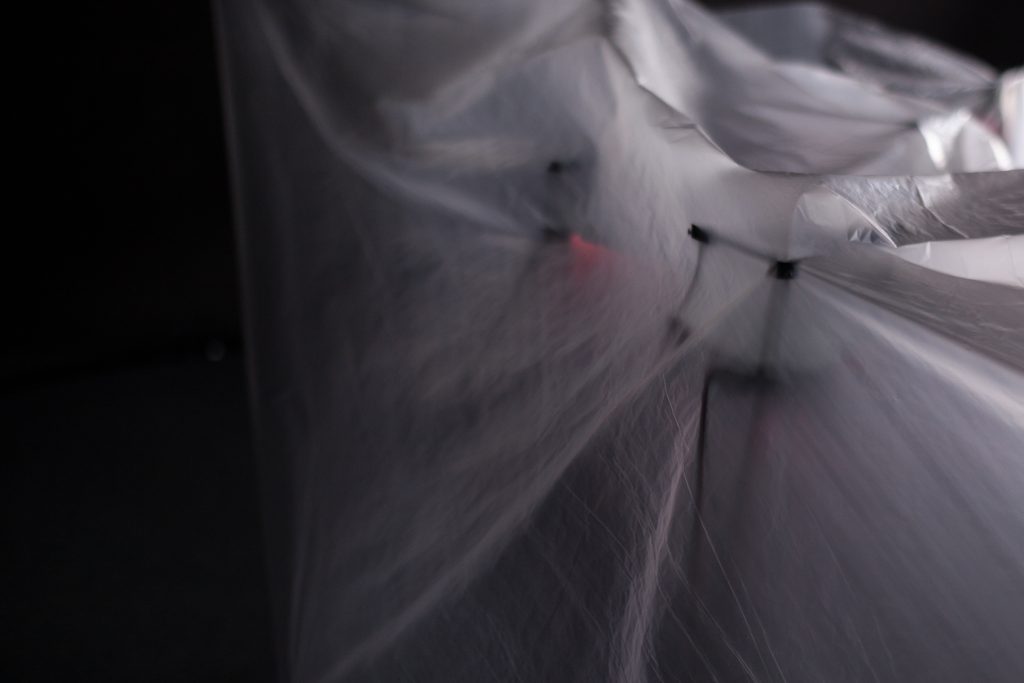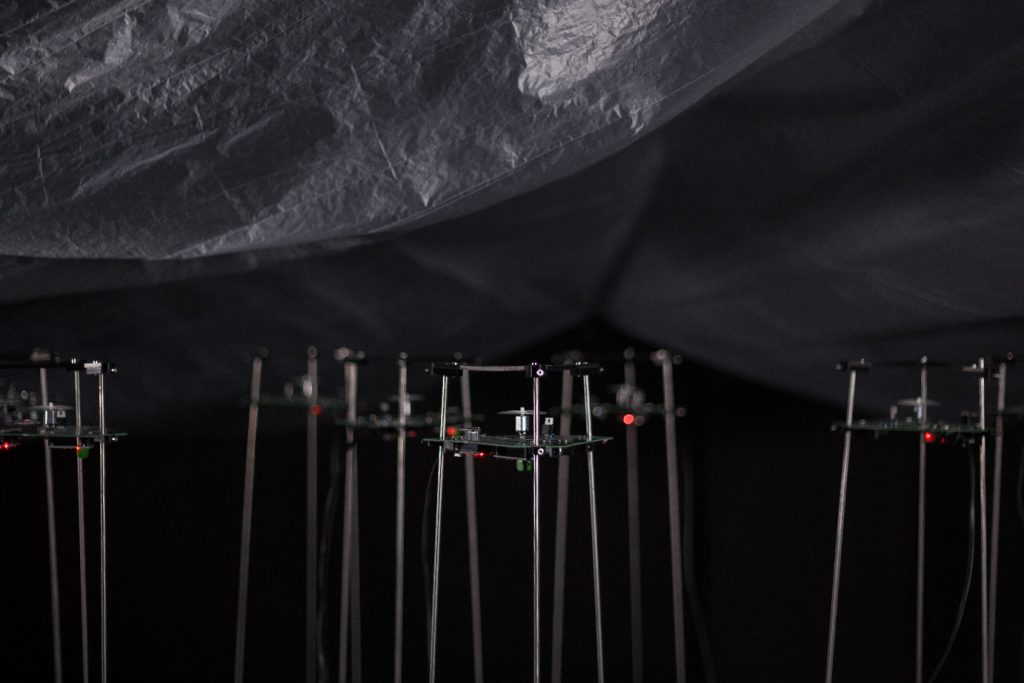Indisposable
Waves of Plastics as Political Spaces
Digitale Medien BA
bei Prof. Dr. Andrea Sick Prof. Ralf Baecker
Indisposable investigates the spatiality of plastics and the politics they hold in spaces as participating materials. The installation is conceptualized and built around concerns of plastics’ influential roles in the realms of contemporary geology and ecology and aims at making their powerful spatial-political agency tangible. Along with the production of undulations Indisposable focuses on the spatiality of plastics at the example of bodies of water.
Emerging from a plastic sheet, that is stimulated by multiple wind-producing machines from below, together they enact the plastic sheet’s wave-like movements. While the plastic sheet reacts to a stronger intensity of the winds by floating upwards, the plastic sheet also moves away from the distance sensors of the machines. Whereas with an increased distance the plastic sheet triggers the machines to produce a less intense wind, which in return engages the plastic sheet to respond by floating down again and to decrease the distance to the machine. Within this feedback loop the plastic sheet modulates the intensitites of the wind machines, causing continous wave-like oscillations.

In their history plastics share at least two reference points with bodies of water: As natural oil and gas reservoirs, that grow as sediments in the ground of the seas over a timespan of millions of years; as well as macro- and micro plastics, when they return to these seas, rivers, lakes and beaches in the form of plastic debris – but this time not alone as a sediment in the ground, but also as accumulated patches of debris that float and circulate within the waters. This plastic debris is known for intruding other bodies: not just bodies of water, but also the bodies of rocks, humans and other animals.
Submitted as a bachelor thesis in Digital Media at the University of the Arts Bremen in 2019, this installation is part of an artistic research, that both were supervised and supported by Prof. Dr. Andrea Sick and Prof. Ralf Baecker. Indisposable as an installation accompanies the theoretical work “Kunststoffe als Glatte und Gekerbte Räume”. This paper extends the spatial-political framing of plastics by retelling a geological and material history of the plastic spaces along the text “The Smooth and the Striated” by Gilles Deleuze und Félix Guattari.

Since the beginning of their mass production in the second half of the 20th century, plastics have been portrayed as boundless, formable materials of fabrication and consumption. Already in 1957 Roland Barthes described this exclusive emphasis on the malleability of plastics as highly reductionist:
“So, more than a substance, plastic is the very idea of its infinite transformation; […] And it is this, in fact, which makes it a miraculous substance: a miracle is always a sudden transformation of nature. Plastic remains impregnated throughout with this wonder: it is less a thing than the trace of a movement.” [1]
This reduction on only their transformability made it possible to speak of plastics neither as substantial materials that derive from a certain time and place, nor as bound to earth and embedded within an ecosystem. Or as Heather Davis puts it: “Plastic became synonymous with ephemerality, seeming to offer a substance without ontology precisely because of this manufactured disposability.” [2]

Today their significant expansion and intrusion of spaces and bodies show, that plastics have long overcome being neither just stuff for construction, nor materials without ontology. And they urge us humans today to acknowledge them as spaces, which we can do by perceiving their spatial qualities and behaviours.
And while it remains true, that by their disposability the plastics have made mass production and consumption demandingly dependending on them, today their actual indisposability has established a new urgency that expands way beyond urban economics into the realms of the rural, the natural, even the deep seas.
This urgency calls us humans to relate to plastics and recognize them as more than just abstracted substances for fabrication. As embedded partaking materials, holding their own powerful spatial agency, qualities and intensities, plastics have never been disposable.



[1] Barthes, Roland: Mythologies, Paris 1957, S. 97
[2] Davis, Heather: Plastic Geology. In Mackert, Gabriele / Petritsch, Paul: Humans Make Nature. Landscapes of the Anthropocene. Universität für angewandte Kunst Wien 2016. S. 220-231
